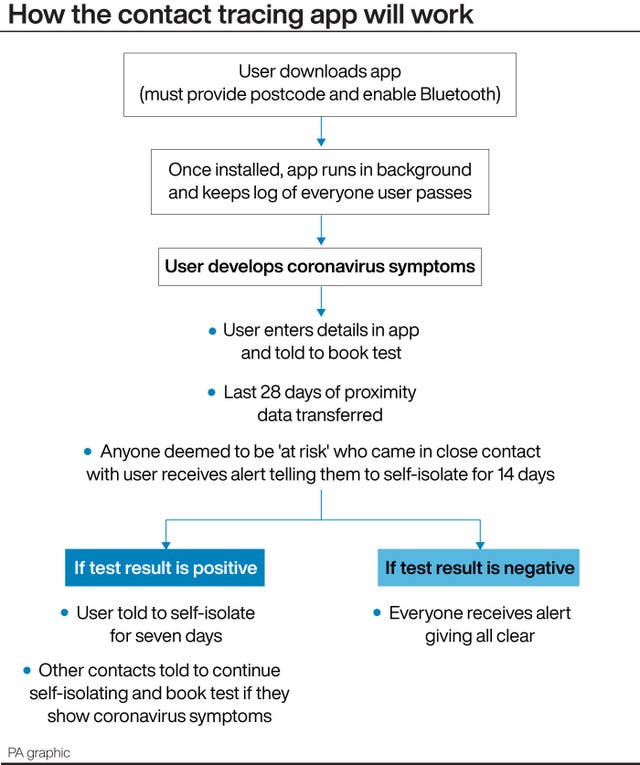How will the coronavirus contact-tracing app work?
A trial of the app-based technology will be carried out on the Isle of Wight before a full roll-out nationwide.
Test, track, and trace has become a key message in the fight against coronavirus and on Monday we learned more about the third element to this crucial approach.
Contact tracing is seen as one of several possible remedies to help the UK out of lockdown and an app trial is now ready to go, ahead of a full roll-out across the country.
– What is contact tracing?
A contact tracing app is one of the Government’s next big areas of focus, part of a wider contact tracing effort, as it tries to find ways to end lockdown while preventing a possible second wave of the virus.
The app uses Bluetooth to keep an anonymous log of everyone you come into close contact with. When they – or indeed yourself – present symptoms of Covid-19, tell the app and it will then alert anyone that has been in close proximity.
“Something that is automated, that can work alongside traditional epidemiological contact tracing is potentially going to be of very great use to us,” Professor Jonathan Van-Tam, deputy chief medical officer for England said.

– What is the app like?
Once installed and set up, the app will run in the background, keeping a log of everyone you pass.
Users will need to provide the first part of their postcode and give the app permission to use Bluetooth, as well as its ability to receive notifications.
Bluetooth will need to be kept on.
When a person is feeling unwell, they need to send a report, stating whether they are experiencing a high temperature and a continuous cough, and when these symptoms started.
If it appears they might have the virus, the person will be told to book a test.
The information is then uploaded, along with the last 28 days of proximity events, and fed into a complex at-risk algorithm which crunches data such as distance, duration and symptoms.
It will only notify those deemed at risk to isolate for 14 days and ask them monitor their symptoms.
If the person’s results come back as negative, those who came into contact with them will be told they are able to come out of isolation.
But should the result be positive, the person will be told to self-isolate for seven days, while those who came into contact with them continue self-isolating and book a test of their own if they have slightest symptom.
– With the Isle of Wight trialling the app, does this mean lockdown will end there?
While those on the Isle of Wight will get to use the app first, this does not mean that lockdown will end there any sooner than the rest of the country.
“For the Isle of Wight, all the same safeguards apply, they should still be following all the same social distancing advice,” said Professor John Newton, director of health improvement for Public Health England.
“It’s a staged development, it’s a staged implementation across the country – this is a really important stage, but to be absolutely clear there is no suggestion that we’re asking the Isle of Wight population to take any additional risks, they will be protected further by having access to testing, additional contact tracing and the use of the app.”
– Will the contract tracing app be effective?
Contact tracing is really dependent on several crucial factors – though NHSX boss Matthew Gould has warned it will not be a “silver bullet”.
“The app is exciting, but it’s also not a silver bullet or a standalone solution, it’s part of this wider strategy … it has to be seen as part of this strategy alongside the expansion of testing and human contact tracing,” he said.
The app is also voluntary, so its effectiveness will rely on the amount of people actually using it.
“Uptake is going to be important and so is the compliance with the app and regularly using it over a sustained period of time – and those are unknowns at the moment,” Professor Van-Tam said.
“The market research we’ve done, I think, indicates for the UK that there’s a fairly significant optimism that people will engage with something that is clearly about protecting the NHS.”
– Will other symptoms be added?
Yes, this is likely with newer versions of the app as understanding about the virus develops.
– What about battery?
Health Secretary Matt Hancock said the app will use a “form of Bluetooth that conserves power so the app won’t drain your battery”.




